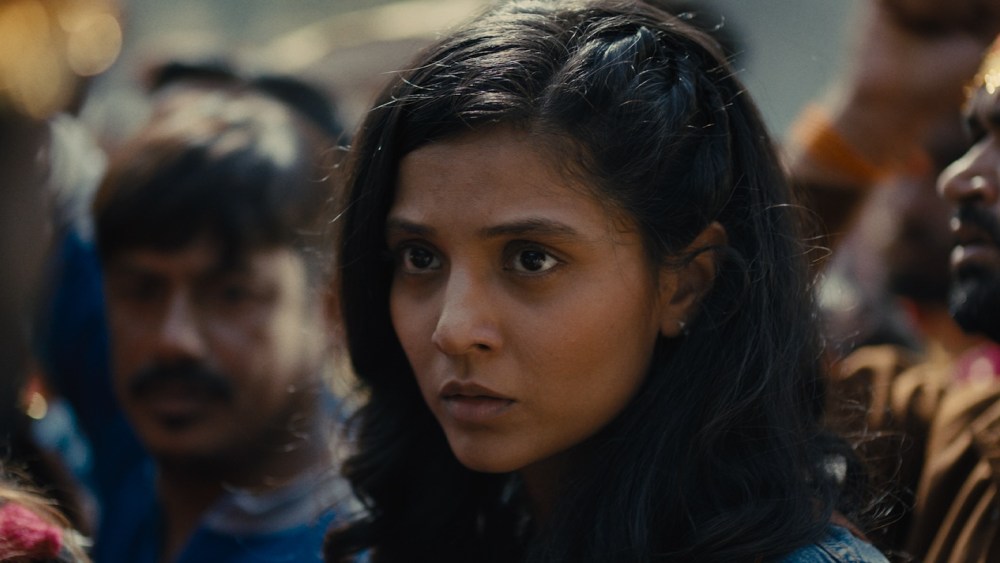Set in smalltown western India, Uttera Singh’s directorial debut “Pinch” (in which the writer-director also stars) unfolds with propulsive rhythms and a bleakly humorous tone. Its subject matter — a young woman dealing with being sexually assaulted by an older neighbor and family friend — ought not to make for raucous subject matter. However, Singh commands both sides of the camera with confidence, even if her storytelling veers toward tying too neat a bow on discomforting material.
“Pinch” opens in medias res with a politically charged occurrence: a crowd at a Hindu festival turns on a man and attacks him for reasons yet unknown, resulting in an act of mob vigilantism — an all-too-common event in modern India. But the movie’s focus isn’t so much the zeitgeist that yields these public beatings, but rather, the strange and amusing way that a young woman present in the crowd, Maitri (Singh), uses this violence to her advantage in a moment of snap judgement.
Singh then flashes back about 24 hours, and builds up to this aforementioned lynching, using social dramedy that emphasizes the patriarchal confines around young Indian woman. All the while, she breaks up her scenes with stray shots and sounds of Indian classical instruments — a chorus that occasionally bleeds into the reality of the film, as its characters traverse apartment hallways en route to each other’s front doors, usually to start or continue some subdued, passive-aggressive conflict.
The middle class Maitri lives in a gossipy building complex with her mother Shobha (Geeta Agrawal). Despite having studied in the United States, her job prospects have flatlined ever since switching careers. She now hopes to make travel videos on YouTube, having seen her best friend and next door neighbor Samir (Badri Chavan) succeed as a food vlogger. But before her upcoming trip to Europe, she must first accompany Shobha and their neighbors — including Samir’s jovial but demanding mother Heena (Sunita Rajwar) — on a religious pilgrimage.
On the long bus ride to the temple, Maitri’s well-respected neighbor and landlord Rajesh (Nitesh Pandey) gropes her in her sleep, and although she wakes up just in time to notice, she’s reluctant to sound any alarms. It soon turns out, however, that the brawl seen in the movie’s prologue was Maitri’s doing, as she slyly manipulates the frustrated festival attendees into unwitting retribution on her behalf, landing Rajesh in the emergency room.
What follows is an unexpected morality play surrounding not only the complications of bringing Rajesh’s actions to light, but also Maitri’s unsavory methods that sparked this violent eruption, which rest on her bringing harm to another, equally vulnerable woman. Unfortunately, Singh wraps up each subplot in too didactic a fashion — Maitri’s unnerving culpability is deserving of far more dramatic focus — but watching a mother and daughter navigate their community’s suspicions makes for a fairly entertaining watch.
Rajesh is undoubtedly the movie’s central culprit, but in sidelining him for much of the runtime, “Punch” takes unique aim at the ways in which even women can become harmful cogs in the patriarchal machine. It’s usually Maitri’s older aunties (and, at times, her own mother) who cast aspersions on her character. However, Maitri’s quiet revolt isn’t as simple as just speaking out. Rather, she and Shobha are forced to deal with the kind of social and financial realities that usually keep women silent in these scenarios.
Figuring out the twists and turns of this social labyrinth is part of the movie’s fun, as Singh imbues Maitri with a sharp, acerbic wit, and captures her most troubled outbursts via a Snorricam rig affixed to her torso, matching her every minor movement. The vlogger aspect of the character is only really a backdrop element — it seldom comes into play in the narrative, beyond depicting desires out of reach — but the resultant meta-text, in which Singh controls her own story by pointing the camera at herself, while Maitri slowly loses footing, is delightfully tongue-in-cheek.
Although brisk in its unveiling, “Pinch” is not the kind of movie that takes major swings to unearth deeply hidden truths. However, it takes firm aim at a culture of silence, one that disguises misogynistic impulses beneath polite façades. That it does so using numerous prickly and imperfect female characters — including Maitri herself, whose selfishness often gets in the way — makes it a minor triumph in the Indian independent landscape.
Read the full article here


